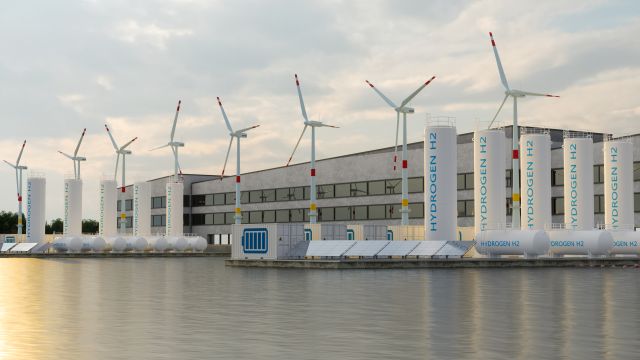
Power-to-gas: Green hydrogen as a building block of the energy transition
energies in the energy sector and make it available for use at a later date and possibly at a different location. It also makes a contribution in other CO2-intensive areas such as mobility or in various branches of industry.
The number of electrolysis plants and their performance has increased steadily in recent years. At the same time, questions about the safety of these plants are increasingly coming into focus.
How GRS is involved
Hydrogen has occupied the experts of GRS for many years. For a long time, the work concentrated on the nuclear sector: hydrogen is produced in nuclear power plants both during normal operation and when accidents occur. For some years now, green hydrogen from renewable energies has also grabbed our attention. Our competences cover the following topics:
- Licensing requirements. Together with all those involved, we develop application-related solutions - for example in the form of guidelines - for current technical and licensing requirements. This has involved analytical work as well as interactive collaboration in the form of workshops.
- Safety analyses. As a research institution, we have an interdisciplinary team of scientists who can use various methods to investigate risks and hazards associated with technical facilities in relation to different events (e.g. pipe rupture, fire, flooding). In particular, we can answer questions about the integrity of technical components such as pipes or pressure vessels, IT security, the common-cause failure of identical components, and human factors.
- Hydrogen accidents. We have long-standing experience in the simulation of hydrogen release and distribution in complex technical facilities as well as in the simulation of hydrogen combustion processes. For this purpose, GRS's own simulation codes have been developed and validated in experiments.
- Crack formation. GRS's own PROST code can be used to investigate the development of cracks under expected cyclic loading in pipes.
- Leak rates. In order to be able to estimate how serious damage is caused by a leakage from a crack, leak areas and outflow rates can be calculated with WinLeck on the basis of the leak geometry, material and medium (water, steam).
- Fire and explosion prevention. The existing experience in the nuclear field can also be applied to other industries or applications. In particular, with MCDET, random events can be incorporated into the simulation of fires and hydrogen releases. These have a great influence on the impact of fires and explosions. Due to the freely selectable simulation codes for fires or explosions, complex phenomena can also be included in the investigations in addition to the random influences.
- Uncertainty and sensitivity analyses. To investigate the influence of uncertainties as a result of insufficient data on simulation results, GRS uses the numerical tool SUSA. With SUSA, a large number of samples can be created from random variables. The parameters of the samples can then be used automatically as input for simulation codes. SUSA allows the determination of sensitivity measures during or after the simulation. This makes it possible to judge which variables have a significant influence on a simulation result.
- Participation in committee work. In order to transfer the findings from our research projects into practice, we participate in various committees (e.g. collaboration on the DVGW Worksheet G 220 "Power-to-gas energy plants" and on the VDI 4635 series of guidelines "Power-to-X“ and in the DECHEMA specialist group "Safety-related design and operation of plants").